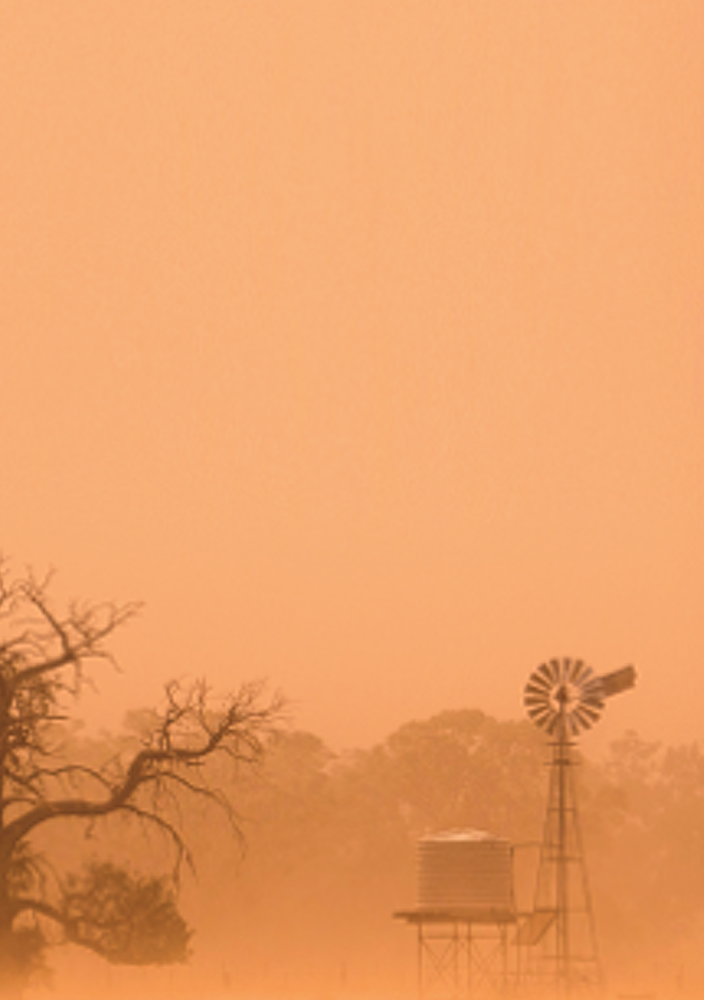
Wendy Baldwin has children in her care who have no idea what rain is, Journalist Sue Osborne writes. She knows of toddlers living on farms who’ve outgrown mud boots that have never been worn.
“We were talking about Peppa Pig the other day, and jumping in puddles, and one of the children asked what that was,” Wendy said.
“It sprinkled for a few moments the other day. A two and a half year old boy asked me ‘what’s that?’”
For 27 years, Wendy has been a teacher for Gwydir Mobile Children’s Service, based in Moree.
She’s part of a team of two teachers and nine educators who travel 1000kms in two Land Cruisers each week, taking the mobile preschool service to remote farming communities.
Family lifeline
Hosted in schools, community halls and tennis clubs, the preschool is a lifeline for isolated families struggling with drought and never ending dust storms.
But Wendy has concerns for the service’s future. As families give up and leave the land, attendance is dwindling, and she fears the Department of Education might cut funding.
This would be a mental health disaster, Wendy said, as the service is often the last port of call.
Wendy and her colleagues are obliged to watch out for the mental health of their families as well as their children.
Wendy had to call Beyond Blue to try and get help recently for a dad she had real concerns for.
Wendy said she has a number of families she is “watching very carefully” for suicide risk.
She has no specific training in dealing with such issues. “I have been through seven droughts, so I have some skills. But I worry about other teachers out there in mobile service.
“Early childhood teachers are part of the community; they are farmers themselves. Teachers often feel responsible for the whole family, they take on the worry, the guilt. My advice is not to try and take on everyone’s problems.”
Trauma support
Wendy would like to see the IEUA NSW/ACT Branch introduce more mental health support for its members in rural and regional areas, in the form of online training on self-care and mental health. In February, IEUA NSW/ACT Branch ran its inaugural dealing with trauma online course, following the bushfires.
Wendy said city based people have trouble understanding what it is like to live with years of drought and dust, and advice such as ‘take a break’ does not cut it.
“How do you take a break when you’re hand feeding lambs? There is no escaping this. Every day you wake up and it hasn’t rained. Everybody is just busted. They shrink into themselves, away from each other, their kids.”
In order to get people reconnecting, the service has organised teddy bears’ picnics, concerts, working bees and talks to try and get people off the farm. They organised journalist Peter Greste to give a talk recently.
“It was great because people started talking about politics and other countries instead of the drought for once,” Wendy said.
“I worry about the toll it takes on early childhood teachers, but school teachers and principals as well. They wonder if their school’s still going to be there in a few years.”
Many families who have been on the land for several generations have left because of mental health pressures. Wendy said the physical and mental health problems from the current drought will resonate for years.
Hope remains
“We’ve been breathing in dust for two years. It’s a fine layer on your skin, clothes, house. The Land Cruisers break down. The optician told me 50% of his work is clearing dust out of people’s eyes. I reckon we’ll be hearing about lung cancers in a few years’ time.
“The mums are being broken apart losing their gardens. It’s all they have. The plants are dying due to lack of water and starving kangaroos eat them. The school where we meet has a small garden, and it’s covered in kangaroo droppings because they come in every night trying to find food and water.
“The kids are bathing in bore water which is bad for the skin. I was talking to one of the other mobile service early childhood teachers out west and she said that after years of teaching the kids healthy habits, they’ve had to start giving them cordial because the water tastes so bad.
“One day people are going to look back at this and fall over in a screaming heap.”
Despite the tragedy, Wendy is optimistic about the future of her community, and believes it will bounce back.
“I get angry when I hear talk on the ABC about farmers needing to adapt. Farmers do nothing but adapt and have been adapting for 50 years. As soon as it rains we are ready, we know exactly what to plant and when.
“When it’s a good season it makes you weep at how spectacular it is. You drive through paddocks of wheat knowing that will feed people in Iraq, England, Africa. It’s a privilege to be part of that. When the sunflowers are high against the blue sky and the grass is up to the cattle’s bellies, it’s breathtaking. All we need is rain.”


































































































































